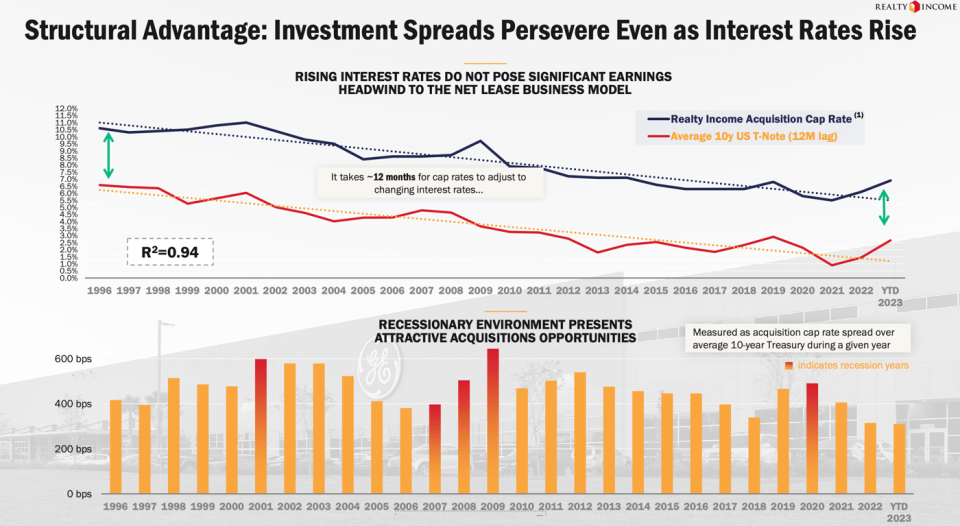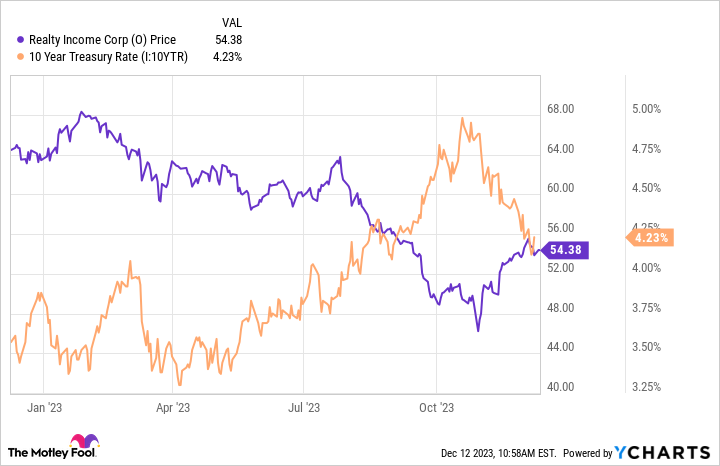
Investors in Realty Income (NYSE: O) have had a tough year. The stock fell as much as 40% from its high and is still down 15% from where it traded 12 months ago. Falling share prices aren’t fun, so when a beloved dividend stock plummets, it can cause people to question the company’s future prospects.
I’m here to tell you that Realty Income is just fine and is an excellent investment idea for 2024 and beyond. More importantly, I’ll explain what happened to the stock and why. Read this and feel confident buying this stellar real estate company.
The relationship between rates and REITs
Realty Income is a real estate investment trust (REIT). That’s a special business structure for real estate companies. It’s a way that investors can benefit from owning real estate without buying buildings. REITs pass on their profits (90% or more of taxable income) to shareholders by design. This has made Realty Income a great dividend stock. Not only does it sport a nice 5.4% yield, but it pays investors monthly dividends.
Since REITs pay out most of their earnings, how do they grow the business? A REIT like Realty Income will use debt or issue new shares of stock (or both) to raise the funds it needs to grow. Ideally, a company can generate a higher return on its real estate portfolio than what it costs to generate its funds, known as the weighted average cost of capital, or WAAC.
The past few years have been among the worst for U.S. Treasury bonds. When bond prices fall, yields go up. Higher yields translate to higher interest rates on borrowing, such as corporate debt. In other words, rising yields make borrowing more expensive, potentially hurting companies like REITs.
Note that the 10-year yield is widely considered a benchmark for interest rates. You can see how the market has treated Realty Income’s stock as the 10-year Treasury yield fluctuates. Notice the inverse relationship they have:
Realty Income is navigating tough waters
Wall Street believes higher rates hurt Realty Income, but is that true? The reality is that Realty Income’s management team is doing a good job navigating these tough waters. For example, the company has been able to manage the spread between its return on funds and a rising 10-year Treasury yield.

Additionally, management has raised its 2023 guidance. Full-year funds from operations (FFO) per share should be between $3.98 and $4.01. That’s an increase over 2022’s $3.92. FFO per share grew 9.2% from 2021 to 2022, so growth slowed due to higher rates. Still, the business hasn’t fundamentally collapsed like its share price might imply.
A bargain as yields retreat?
After nearly touching 5%, the 10-year Treasury yield has fallen to just over 4%. It will likely aid Realty Income’s stock if the yield continues dropping, though nobody can predict the future. You can evaluate where Realty Income trades today and judge how attractive the stock is based on its fundamentals.
At a share price of $65 and guided FFO per share of $4, the stock trades at a price-to-FFO ratio of just over 16. The company has grown its FFO per share by a median of 5% annually since 1996, so it seems reasonable to use that growth rate moving forward.
Considering the broader market grows profits by 9% to 10% annually and trades at a P/E ratio of 20, Realty Income’s current valuation seems on par with where it should trade. That means investors can look for FFO growth to translate to investment returns, plus the dividend yield, totaling annual returns between 10% and 11% moving forward.
Long-term investors willing to let those dividends pile up and reinvest them could do quite well with Realty Income in 2024 and beyond.
Should you invest $1,000 in Realty Income right now?
Before you buy stock in Realty Income, consider this:
The Motley Fool Stock Advisor analyst team just identified what they believe are the 10 best stocks for investors to buy now… and Realty Income wasn’t one of them. The 10 stocks that made the cut could produce monster returns in the coming years.
Stock Advisor provides investors with an easy-to-follow blueprint for success, including guidance on building a portfolio, regular updates from analysts, and two new stock picks each month. The Stock Advisor service has more than tripled the return of S&P 500 since 2002*.
*Stock Advisor returns as of December 11, 2023
Justin Pope has no position in any of the stocks mentioned. The Motley Fool has positions in and recommends Realty Income. The Motley Fool has a disclosure policy.
This Monthly Dividend Stock Fell 15% in 2023. Here’s Why 2024 Could Be Much Better. was originally published by The Motley Fool







